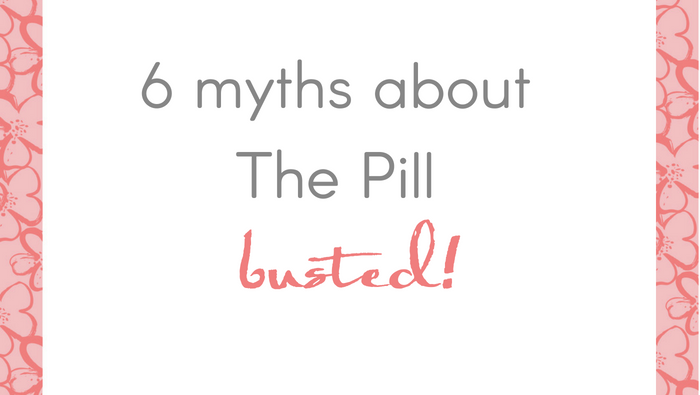I was on The Pill. A long time ago. I wish I had known then what I know now. I’d never have taken it. But it was my choice. Made rashly, I now realise.
We all have choice. These days, I like to make informed choices: choices based on info from a range of different sources. And I encourage people to do the same. I do respect the choices others make.
Here, I’m just busting a few myths. To help women decide if The Pill is a sensible choice for them or not. It doesn’t go into the risks and side effects. That’s one for another day and a whole other blog or three. For the benefits, please visit any conventional medical website.
Let’s look at some common myths…
#1 The Pill Is Made From Hormones
Nope.
The Pill contains drugs that are similar to hormones, but they are not identical to natural hormones produced in our bodies.
They have similar chemical structures. They are pseudo-hormones if you like.
I always think of our whole hormone system as like an orchestra – all perfectly-tuned, different instruments played expertly in harmony to create a beautiful sound. Remember, ALL our hormones are interlinked; not just our sex hormones.
To me, The Pill is like a out-of-tune, out-of-time, loud horn. Yes, it’s still playing in the band and in the performance, but it’s just not right. It’s not the right fit. It’s not harmonious. And it’s getting a response from the audience, but maybe not the one the conductor wanted.
The Pill’s synthetic hormones kinda “fit” into our natural hormone receptors, but they aren’t a perfect match. They don’t function in the way natural hormones do. Which means our bodies don’t function in the way nature intended.
Synthetic hormones have side-effects, switch off our own hormones and suppress ovulation.
And ovulation is a normal body process which produces sex hormones oestrogen and progesterone…which have many functions in women’s bodies, not just menstrual cycles, fertility, pregnancy and so on.
#2 You Still Get A Period On The Pill
The bleeds women get when taking The Pill are “withdrawal” bleeds caused by a break in the synthetic hormones. That’s not the same as a period. You’re not having a menstrual cycle or periods if you’re taking hormonal contraception.
Did you know that The Pill’s 28 day pattern is just chosen to represent an average cycle? To reassure us that it’s in tune with our natural cycles and rhythms. When it’s not.
Drug companies could choose any pattern. Indeed, there are some pill programmes dosed to bleed less than once a month.
#3 The Pill Controls Periods and Regulates Hormones
The Pill was developed as a means of birth control. At a time when contraception was illegal.
So, it was promoted as a miracle cure to treat female issues and to control or normalise periods. Where normalising periods really meant preventing pregnancy.
And nothing’s changed. Doctors still prescribe it to normalise periods and regulate hormones. When really, it suppresses cycles; the period is actually a withdrawal bleed; The Pill’s synthetic hormones are not balancing our natural hormones.
FYI I am all for women’s sexual freedom and preventing unwanted pregnancies. I just know that there are lots of options for contraception; synthetic hormones are one choice available.
#4 The Pills “Mimics” Pregnancy
I have heard people promote The Pill by saying it’s like the pregnant or breastfeeding states of our distant grandmothers. Women did have fewer ovulations and periods in the past, because they had more pregnancies and breastfed their children.
We maybe have over ten times as many periods as our great-grandmothers, I read somewhere. Our health, hormones and fertility are very different from those days.
Taking The Pill is not the same as having multiple pregnancies and breastfeeding for a long time. Pregnancy hormones help protect us from certain cancers and heart disease. Synthetic hormones do not prevent cancer – indeed they increase slightly the risk of breast and liver cancer and increase risk of blood clots. It’s not the same at all.
#5 New Pills Are Much Safer
All drugs come with risks and side effects. Newer hormonal contraceptives carry with them risks and side effects too.
Learn these before you make a final decision on taking any medication or choosing a treatment. Conventional or complementary.
Ask a Doctor or Pharmacist. Read the packet inserts. Do your research. And then decide.
#6 The Pill Cures Some Reproductive Health Issues
Not true either.
Some women are prescribed The Pill after a diagnosis of a condition like PCOS or amenorrhea (no periods). Or due to unwanted symptoms, like heavy periods and flooding.
If we had heavy bleeding before, we’re only masking the cause when we choose The Pill. We’re not fixing the real issue. It’s not a cure. And it’s the same with any diagnosis or label we’ve been given.
It just might come back when we stop taking The Pill.
When we stop hormonal contraception because we want to try for a baby, we may have been living with a suppressed condition for years. And that condition might be one that makes natural conception trickier. It still needs to be addressed. Either by restoring health and hormone balance naturally (that’s what I teach and support women and couples to do) or through fertility treatments …which can mean even more artificial hormones overriding normal, natural body processes.
I end where I started. On the subject of choice. Our body, our choice. And amen to that. Please make your own decision on full information, gathered from a range of reliable sources.
I hope this is one source.
If you’re considering stopping The Pill, I have loads of great hints and tips on restoring balance, naturally. Get in touch.
Love,



Recent Comments